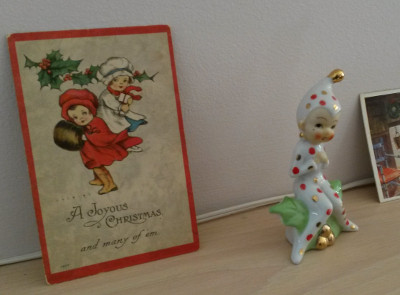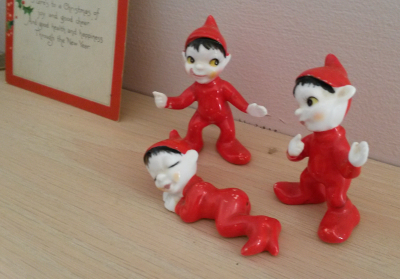As the Humans Say
Dialogue for Aliens
Saturday, July 21, 2018 5:28 pm
In The Corbomite Maneuver, an episode from the original Star Trek, an alien named Balok has decided to destroy the Enterprise. Balok then grants the crew some time to make peace with their Deity or deities. And how much time does Balok give the crew? "Ten Earth time periods known as minutes."
Yet Another Blog Hiatus Ends
Too Much Time Spent Being a Space Ninja
Saturday, July 21, 2018 12:18 pm
Well, well. I haven't posted in eight months. Story of my blog-life.
The latest fiction writing I've done was leading up to April 15th, the deadline for submitting to the Luna Anthology from Superversive Press. I had previously submitted to the Pluto Anthology — and wonderful news! My Pluto story was accepted. However, there has been no final word on my Luna story. It's great, so of course it will be accepted; but still. There has also been no follow-up on my Pluto story (for editing and such). It seems Superversive Press is a little behind. The months are passing away. I hope both anthologies — both with my stories — still come out this year.
Otherwise I've been dithering. Mostly I've been obsessing over Warframe, a video game about being a space ninja. I've never been quite so much the fanboi. I've even started watching Twitch streams for Warframe, something I've done for no other game. Warframe is great.
Whatever my obsession, I could still have done some writing. In some ways I just can't decide what to do. A new Hamlin Becker tale for StoryHack? A submission for the Sol Anthology? Some chapters for my poor neglected novel? But in most ways I've just been disinclined to write. I do grant that a writer should never wait around for inspiration, but of late "uninspired" doesn't half cover my unproductivity.
I'm hoping a few blog posts will grease my gears.
The latest fiction writing I've done was leading up to April 15th, the deadline for submitting to the Luna Anthology from Superversive Press. I had previously submitted to the Pluto Anthology — and wonderful news! My Pluto story was accepted. However, there has been no final word on my Luna story. It's great, so of course it will be accepted; but still. There has also been no follow-up on my Pluto story (for editing and such). It seems Superversive Press is a little behind. The months are passing away. I hope both anthologies — both with my stories — still come out this year.
Otherwise I've been dithering. Mostly I've been obsessing over Warframe, a video game about being a space ninja. I've never been quite so much the fanboi. I've even started watching Twitch streams for Warframe, something I've done for no other game. Warframe is great.
Whatever my obsession, I could still have done some writing. In some ways I just can't decide what to do. A new Hamlin Becker tale for StoryHack? A submission for the Sol Anthology? Some chapters for my poor neglected novel? But in most ways I've just been disinclined to write. I do grant that a writer should never wait around for inspiration, but of late "uninspired" doesn't half cover my unproductivity.
I'm hoping a few blog posts will grease my gears.
Favor the Heart Over the Tail
Hacksaw Ridge Is an Amazing 40 Minutes
Tuesday, November 28, 2017 9:14 pm
Beware! Spoilers follow.
 For its first hour or so, Hacksaw Ridge is very disappointing. For another half hour it is active, if not exciting. And then there is a scene that is transcendent; and the remainder of the movie is wonderful.
For its first hour or so, Hacksaw Ridge is very disappointing. For another half hour it is active, if not exciting. And then there is a scene that is transcendent; and the remainder of the movie is wonderful.

Not Quite Decking the Halls
But a Very Pleasant Array
Tuesday, November 28, 2017 12:12 pm
In years past, my curmudgeonly sadness was such that I refused to decorate my home for Christmas. In recent years, however, this year included, I have been quite in the spirit. And much as this is not really a personal blog, I'd still like to share my usual Christmas decor.
My Grandchild Is a Cat?
 Today I saw this sticker on a bumper. It is evil. I mean that. The person who displayed this — who apparently should be a grandparent to a human being — instead can claim only a cat. While it is possible that she is expressing some bitterness — "I gave my child life and all I got was a lousy cat!" — I imagine, rather, that she is cheerily joining in the maudlin elevation of a cat.
Today I saw this sticker on a bumper. It is evil. I mean that. The person who displayed this — who apparently should be a grandparent to a human being — instead can claim only a cat. While it is possible that she is expressing some bitterness — "I gave my child life and all I got was a lousy cat!" — I imagine, rather, that she is cheerily joining in the maudlin elevation of a cat.
It is pleasing to Satan when you call your pet your child. It is pleasing to Satan when you treat your pet like a child. It is pleasing to Satan when you settle for a pet instead of a child. Satan hates children. Satan hates people. He revels in the barrenness of modern women. He delights in the non-existence of new people, of new souls made in the image of God, of new creatures oriented to the knowledge of God.
Equating a cat to a child is sentimental nihilism. It is a retreat from family and from human life. If all you have is a cat, then all you have is a cat. Don't imagine that you are the equivalent of a mother. You own a pet. You own an animal. You are caught in narcissistic affection. If, in unconscious recognition of your wasted fertility, you dare to call your pet a child, you serve only those who hate the perpetuation of man.
A Pet Has None of the Value of a Child
Sunday, November 26, 2017 1:46 pm

It is pleasing to Satan when you call your pet your child. It is pleasing to Satan when you treat your pet like a child. It is pleasing to Satan when you settle for a pet instead of a child. Satan hates children. Satan hates people. He revels in the barrenness of modern women. He delights in the non-existence of new people, of new souls made in the image of God, of new creatures oriented to the knowledge of God.
Equating a cat to a child is sentimental nihilism. It is a retreat from family and from human life. If all you have is a cat, then all you have is a cat. Don't imagine that you are the equivalent of a mother. You own a pet. You own an animal. You are caught in narcissistic affection. If, in unconscious recognition of your wasted fertility, you dare to call your pet a child, you serve only those who hate the perpetuation of man.
No, Not That Kind of Pulp
Here's the Kind I Mean
Tuesday, November 21, 2017 10:53 am
Old pulp has a reputation as vulgar, trashy, lurid, and low; and in their apologetics, the proponents of new pulp are usually quite aware of that reputation.
Sometimes the apology is an outright apology. Some proponents, for example, explicitly disavow the "racism" and "misogyny" of old pulp. Well, okay. I'm not here to hate races or women, either. But declaring against "racism" and "misogyny" is a concession to the very Stalinist conformity that has been destroying our fiction. Those words are no longer reasonable; the enemy has defined them. These days, putting a woman in a dress and saying she is not the same thing as a man is considered "misogyny." Virtue signaling is not the path to better fiction.
Sometimes the apology is an outright apology. Some proponents, for example, explicitly disavow the "racism" and "misogyny" of old pulp. Well, okay. I'm not here to hate races or women, either. But declaring against "racism" and "misogyny" is a concession to the very Stalinist conformity that has been destroying our fiction. Those words are no longer reasonable; the enemy has defined them. These days, putting a woman in a dress and saying she is not the same thing as a man is considered "misogyny." Virtue signaling is not the path to better fiction.
Writing About Pluto
Get a Free Copy of Poof Poof Ya Does Me a Favor
Sunday, November 19, 2017 5:12 pm
Superversive Press is creating a series of anthologies, each of them focused on one of the nine planets in our system. I really like this idea and, when I heard about the series, immediately wanted to contribute.
Several anthologies, such as those for Mars and Venus, were already closed for submission. Luckily I wasn't left with only Uranus. Pluto was still available.
Several anthologies, such as those for Mars and Venus, were already closed for submission. Luckily I wasn't left with only Uranus. Pluto was still available.
© 2004-25 David Skinner · All rights reserved





